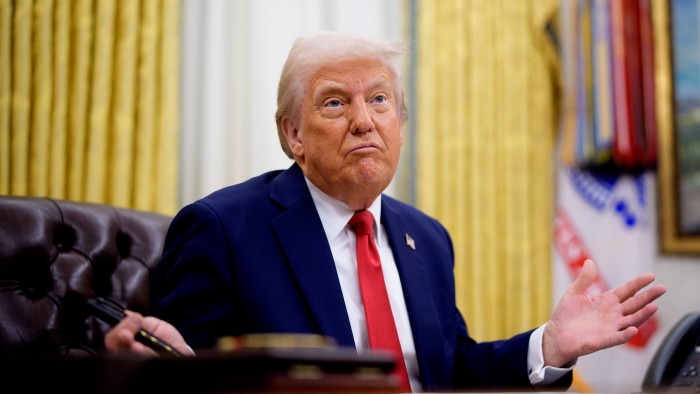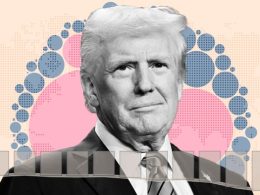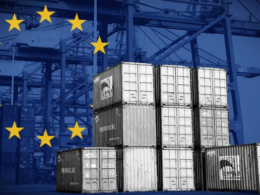I live inside the beltway of wishful thinking, Washington DC. Swampians will thus forgive the question in my headline. The US Capitol’s patron saint ought to be Dr Pangloss. To be fair, however, the spirit of sunny self-delusion also incorporates Wall Street, at least until yesterday’s meltdown.
From the moment Trump’s victory began to look probable last autumn, Trump sanewashers have torn through the rule book of reassuring explanations. The first one was that Trump is, at heart, a businessman and never means his threats. I took BlackRock’s chief executive, Larry Fink, to task in this newsletter last October for just that: “I’m tired of hearing this is the biggest election in your lifetime,” Fink said. “The reality is over time it doesn’t matter.” Rarely has utopian self-soothing been so quickly disabused.
But Fink was in good company. The market relief that greeted the appointments of Scott Bessent as US Treasury secretary and Howard Lutnick as commerce secretary was matched by a collective cheer among the chattering classes. Just like Trump’s first term, the adults would be in charge. While Bessent may qualify as such, he has little influence. Lutnick, by contrast, is a full-blown amplifier of Trump’s craziest economic impulses. Only the president’s trade adviser Peter Navarro, an autarchist ex-felon, outbids Lutnick.
To be fair, hope is an elixir of life. But it is wasted on Lutnick. Last week a senior foreign trade official visited Washington and made the point to Trump officials that Europe’s value added tax was not a trade subsidy — a long-running bugbear of Trump’s that fails the laugh test. The officials agreed with the visiting foreigner that VAT does not distort trade but threw up their hands. What can we do? was the gist of their response. The boss believes it. The exception was Lutnick, who vigorously defended Trump’s theological approach to trade. Lutnick is an enabler.
Which brings me to the latest bout of wishful thinking; that Trump is committing economic hara-kiri and will soon thus have his political wings clipped. I am not saying I disbelieve this scenario. There is no doubt that Trump’s approval ratings will continue to fall as the economic cost of his global trade war and the Doge assault on core federal functions mounts. But from the moment of his 2015 mockery of US prisoners of war and mimicry of a disabled reporter onwards, I have been wary of another branch of the Panglossian school, the “He’s really gone and done it now” one.
To be sure, the Trump administration is amateur hour. From the way they calculated the “liberation day” tariffs to the Signal group chat that disclosed lethal secrets to a journalist on a hackable medium, Trump’s team is packed with the clueless and the reckless. But they have great expertise in disinformation. If there is a core specialism to Trump’s appointments, it is that they are a product of the hard-right media sphere. Even those, such as JD Vance, who did not have a Fox News show, or a Newsmax column, bear all the characteristics of ones who has forged their persona in the “Dark Enlightenment” echo chamber. They have been schooled in the art of brazen lying. One Republican this week even approvingly quoted Joseph Goebbels, Hitler’s chief propagandist. If you think I’m exaggerating, watch it.
So my bottom line is this: yes Trump is ruining American growth prospects, institutions, global soft power, and so many other things. And yes, most Americans will come to realise the cost of Trump’s agenda. But as long as Trump has his legion of Maga supporters behind him and a host of centibillionaires, including Silicon Valley’s leading oligarchs, he will persist in his ways. When his back is to the wall, he is at his most dangerous. This is the man, after all, who tried to overthrow an election and suffered no consequence. He isn’t going to stop now.
I’m turning this week to my colleague Alan Beattie, author of the must-read Trade Secrets, and a former colleague here in DC. Alan, you’ve already laid out many of the costs of Trump’s “tariff pathology” here. But I’m very curious to hear your forecast of the global dynamic. Is this a massive opportunity for China?
Recommending reading
Alan Beattie responds
Hi Ed, and I couldn’t agree more about the hopium you had to be smoking to imagine the political lightweights in Trump’s economics team were going to restrain his destructive impulses.
On China, Xi Jinping will portray himself as the defender of globalisation and the rules-based trading system, just as he did in a celebrated speech at Davos in 2017 as Trump began his first term.
But other governments will be a little sceptical. What the world really needs to replace the US is a consumer of last resort, and it’s supremely bad timing that China, with its household and local government finances screwed by the property bubble, is turning back to export-led growth instead. Imports blocked by the US will get diverted elsewhere and the global economy will be awash in cheap goods, undercutting producers worldwide. Xi may not be a destructive protectionist like Trump, but the trading system needs buyers rather than sellers.
Click here to sign up for Alan’s Trade Secrets newsletter, delivered every Monday.
Your feedback
And now a word from our Swampians . . .
Your response to: “Tariffs and their discontents”:
“If, in sizing up the various complexities in trade and tariff policies, it can be shown, as Ms Foroohar is saying, that in a broad, general way there is a lack of fairness experienced by Americans, shouldn’t the Trump administration act more deliberately than it is doing?
Explain the situation to the public in the simplest terms possible and explain the goal he is seeking to ameliorate the unfairness. Then explain the graduated steps the US will take over the next four (five, or ten) years to reach that goal by making changes in tariff and other trade policies. And also explain that at every interval, the US will be negotiating with other blocs willing to do so to arrive at the best, mutually agreeable outcomes. Simply using a shotgun with 30 days’ notice is both irrational and scary.” — James W Skillen
Your feedback
We’d love to hear from you. You can email the team on swampnotes@ft.com, contact Ed on edward.luce@ft.com and Alan on alan.beattie@ft.com. We may feature an excerpt of your response in the next newsletter
Source link









